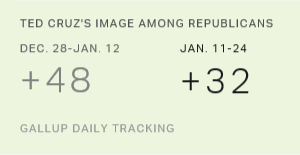PRINCETON, NJ -- The Republican Party's image has gone from bad to worse over the past month, as only 34% of Americans in a Nov. 13-16 Gallup Poll say they have a favorable view of the party, down from 40% in mid-October. The 61% now holding an unfavorable view of the GOP is the highest Gallup has recorded for that party since the measure was established in 1992.
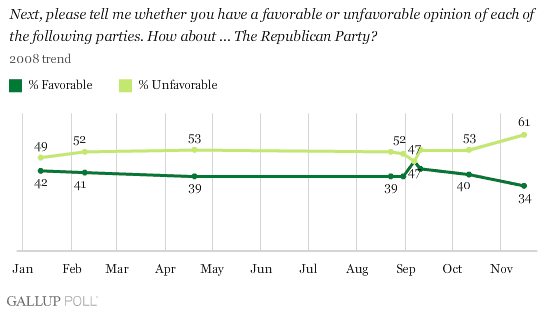
By contrast, the public's views of the Democratic Party remain as positive after the election as they were just prior to it. More than half of Americans, 55%, currently hold a favorable view of the Democratic Party and only 39% an unfavorable view, highly typical of views toward the Democrats all year.
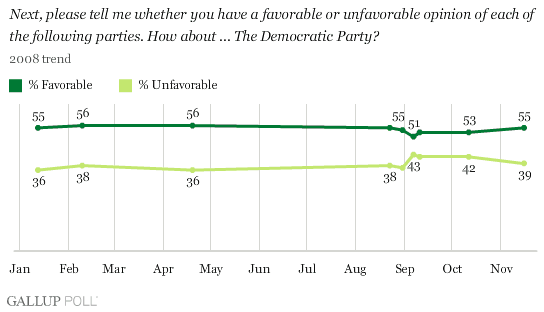
The Republican Party's image deficit began well before 2008. In December 2005, the Republicans and the Democrats were rated about equally, with just under half of Americans viewing each party favorably. Shortly thereafter, the Republicans' favorable rating fell to 36%, and has since struggled to cross the 40% threshold. The Democrats' favorable rating gradually improved during 2006, and has not fallen below 51% since the spring of that year.
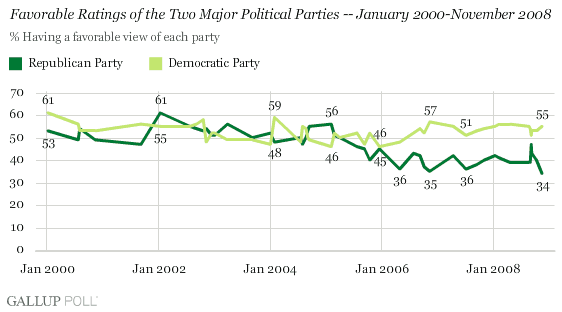
The Republican Party is notably less well reviewed by members of its own party than the Democratic Party is by its own: 78% of Republicans have a favorable view of the GOP, versus 91% of Democrats viewing their own party favorably. Fewer political independents rate the Republican Party (32%) than rate the Democratic Party (47%) favorably.
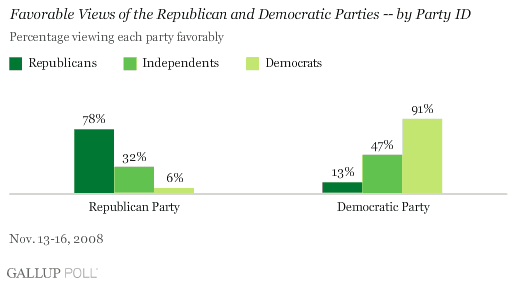
Where to Go From Here?
The Republican Party heads into the New Year with its brand tattered by the election after decisive losses in the 2008 presidential and congressional races. Such a defeat inevitably leads to introspection in party circles about its message going forward.
Gallup addressed this issue in the recent poll with a question asking, "Over the next few years, would you like to see the Republican Party and its candidates move in a more conservative direction, a less conservative direction, or stay about the same?"
Most rank-and-file Republicans (59%) want to see the party move in a more conservative direction and another 28% want it to remain about the same. Only 12% would prefer to see the Republican Party become less conservative.
Neither party can win the presidency or majority power in Congress without attracting substantial support from political independents. But right now, independents are not offering any clear guidance about what they want from Republicans. About a third say the party should become more conservative, an equal percentage say it should become less conservative, and just under one-quarter say it should stay the same.
Democrats -- whose views about the Republican Party are far less relevant to its future -- are most likely to favor its moving in a less conservative direction.
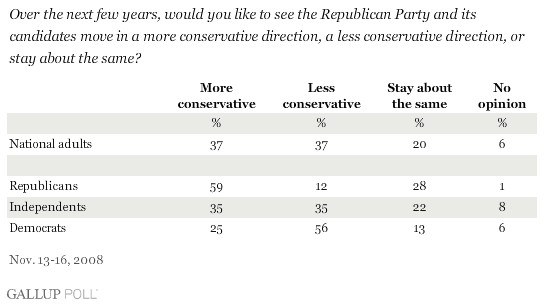
Bottom Line
The Democratic Party is enjoying an extended stretch of popularity with Americans that started in 2006, and is likely to continue as long as its new party leader, President-elect Barack Obama, continues to inspire high confidence ratings -- and eventually job approval ratings -- from the American people.
After suffering major blows in the election, the Republican Party is experiencing its worst image rating in at least a decade (similar to the public relations hit it took after the Republican-controlled House of Representatives impeached Bill Clinton in December 1998). Previous Gallup analysis linked the party's decline to the downward track of President George W. Bush's job approval ratings in 2005 and 2006. However, the latest drop in the Republican Party's favorable rating, from 40% to 34% (with much of that drop coming from Republicans), is not associated with a corresponding decline in Bush's job approval score; rather, it most likely reflects Americans' reaction to the Republicans' big losses on Election Day.
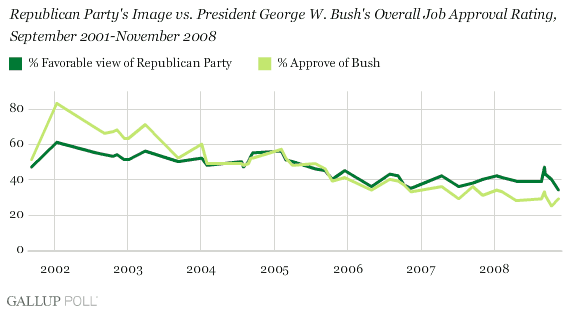
With Bush no longer around to symbolize the Republican Party, the GOP will soon have an opportunity to redefine itself. The initial guidance from rank-and-file Republicans is to tack to the right -- returning to core Republican principles, as many Republican thought leaders are currently advocating. However, with only about a third of independents wanting the party to be more conservative, it is unclear how much that approach might help to expand the Republican base.
Survey Methods
Results are based on telephone interviews with 1,009 national adults, aged 18 and older, conducted Nov. 13-16, 2008. For results based on the total sample of national adults, one can say with 95% confidence that the maximum margin of sampling error is ±3 percentage points.
Interviews are conducted with respondents on land-line telephones (for respondents with a land-line telephone) and cellular phones (for respondents who are cell-phone only).
In addition to sampling error, question wording and practical difficulties in conducting surveys can introduce error or bias into the findings of public opinion polls.
